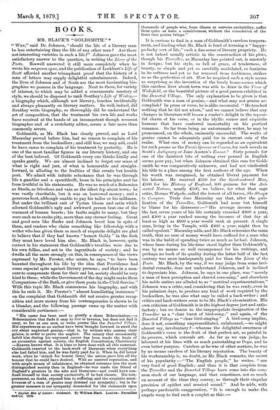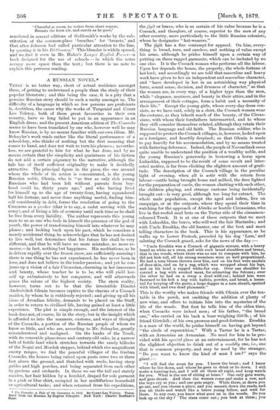BOOKS.
MR. BLACK'S "GOLDSMITH." * " Way," said Dr. Johnson, "should the life of a literary man be less entertaining than the life of any other man ? Are there not interesting varieties in such a life ?" Johnson gave the most satisfactory answer to the question, in writing the Lives of the Poets. Boswell answered it still more completely when he wrote his magnum opus, and the publication of Lockhart's _Life of Scott afforded another triumphant proof that the history of a man of letters may supply delightful entertainment. Indeed, the lives of Johnson and of Scott are the most fascinating bio- graphies we possess in the language. Next to these, for variety of interest, to which may be added a consummate mastery of style, we should be disposed to rank Southey's We of Wesley,— a biography which, although not literary, touches incidentally and always pleasantly on literary matters. So well-, indeed, did Southey write biography, so thoroughly did he understand the art of composition, that the treatment his own life and works have received at the hands of an incompetent though reverent biographer and of a crotchetty editor, seems a fate more than commonly severe.
Goldsmith, as Mr. Black has clearly proved, and as Lord Macaulay proved before him, had no reason to complain of his treatment from the booksellers ; and still less, we may add, could he have cause to complain of his treatment by posterity. He is one of the most familiar figures in our literary history, and one
of the best beloved. Of Goldsmith every one thinks kindly and speaks gently. We are almost inclined to forget our sense of what is right and just, of what is honourable and straight- forward, in alluding to the frailties of this erratic but lovable poet. We admit with infinite reluctance that he was through
life a gambler and a spendthrift, loose in his principles and far from truthful in his statements. He was as much of a Bohemian as Steele, as frivolous and vain as the idlest fop about town ; he was vastly charitable, but it was on borrowed money; and a generous host, although unable to pay his tailor or his milkman But under the brilliant suit of Tyrian bloom and satin which adorned Goldsmith's ugly and awkward person beat one of the warmest of human hearts ; his faults might be many, but they were such as to excite pity, more than any sterner feeling. Great and good men like Burke and Johnson loved him in spite of them, and readers who claim something like fellowship with a writer who has given them so much of exquisite delight are glad to believe that if they had known "honest Goldy " in the flesh they must have loved him also. Mr. Black is, however, quite correct in his statement that Goldsmith's troubles were due to his own follies, and not to the ingratitude of society ; and he dwells all the more strongly on this, in consequence of the views expressed by Mr. Forster, who seems, he says, "to have been haunted throughout his life by the idea that Providence had some especial spite against literary persons ; and that in a mea- sure to compensate them for their sad lot, society should be very kind to them; while the Government of the day might make them Companions of the Bath, or give them posts in the Civil Service."
With this topic Mr. Black commences his biography, and with this he ends it. Mr. Forster's "almost humiliating insistence" on the complaint that Goldsmith did not receive greater recog- nition and more money from his contemporaries is shown to be a blunder, and the following passage sums up the matter with considerable pertinence :—
"His name has been used to glorify a sham Bohemianism,—a Bohemianism that finds it easy to live in taverns, but does not find it easy, so far as one sees, to write poems like the Deserted Village. His experiences as an author have been brought forward to swell the ery about neglected genins,—that is, by writers who MECUM@ their genius, in order to prove the neglect. The misery that occasionally befell him during his wayward career has been made the basis of an accusation against society, the English Constitution, Christianity —Heaven knows what. It is time to have done with all this nonsense. Goldsmith resorted to the hack-work of literature when everything else had failed him, and he was fairly paid for it. When he did better work, when he'struck for honest fame, the nation gave him all the honour that he could have desired. With an assured reputation, and -with ample means of subsistence, he obtained entrance into the most distinguished society then in England—he was made the friend of England's greatest in the arts and literature—and could have con- fined himself to that society exclusively, if he had chosen. His tem- perament, no doubt, exposed him to suffering, and the exquisite sensi- tiveness of a man of genius may demand our sympathy ; but in far greater measure is our sympathy demanded for the thousands upon * English Men of Leiters: Goldsmith. By William Black. London : Macmillan and Co. 1878.
thousands of people who, from illness or nervous excitability, stiffer from quite as keen a sensitiveness, without the consolation of the fame that genius brings."
It is curious to find in a man of Goldsmith's careless tempera- ment, and leading what Mr. Black is fond of terming a " happy- go-lucky sort of life," such a fine sense of literary propriety. He is not indeed usually artistic in the construction of his plots, though his Traveller, as Macaulay has pointed out, is masterly in design; but his style, so full of grace, of tenderness, of beauty, so simple and yet so carefully modulated, so feminine in its softness and yet so far removed from feebleness, strikes us as the perfection of art. How he acquired such a style seems as surprising as the invention of the lovely home-scenes which this careless liver about town was able to draw in the Vicar of Wakefield, or the beautiful picture of a good parson exhibited in the Deserted Village. The only explanation to be given is that Goldsmith was a man of genius,—and what may not genius ac- complish? In prose or verse, he is alike successful. "He touched nothing that he did not adorn," and we cannot believe that any changes in literature will lessen a reader's delight in the repose- ful charm of his verse, or in the idyllic scenes and exquisite humour that have conferred immortality on his poetical romance. So far from being an unfortunate writer, he may be pronounced, on the whole, eminently successful. The works of genius cannot be adequately paid for in current coin of the realm. What sum of money can be regarded as an equivalent for such poems as the Faerie Queene or Comus, for such novels as Scott's Antiquary or Jane Austen's Emma ? Sixty pounds for one of the daintiest bits of writing ever penned in English seems poor pay, but when Johnson obtained this sum for Gold- smith he was comparatively unknown, and had not vindicated his title to a place among the first authors of the age. When his worth was recognised, he obtained liberal payment for his labour. He received 2500 for the Good-natured Man, 2500 for his History of England, 800 guineas for the Ani- mated Nature, nearly £500, we believe, for what that sage critic, Horace Walpole, called the lowest of all farces, She Stoops to Conquer. Truly does Macaulay say that, after the pub- lication of the Traveller, Goldsmith had none but himself to blame for his distresses :—" His average income during the last seven years of his life certainly exceeded 2400 a year, and 2400 a year ranked among the incomes of that day at least as high as 2800 a year would rank at present. A single man, living in the Temple, with 2400 a year, might then be called opulent." Macaulay adds, and Mr. Black reiterates the same truth, that no sum of money would have sufficed for a man who was in the habit of spending twice as much as he had. Johnson, whose fame during his life-time stood higher than Goldsmith's, was by no means so well recompensed for his writings, and perhaps no book of its quality during the latter half of the last century was more inadequately paid for than the Lives of the Poets. Mr. Black, by the way, if we may judge from some inci- dental remarks, does not understand Johnson, and is inclined to depreciate him. Johnson, he says in one place, was "merely a man of keen perception and shrewd reasoning," and elsewhere his noble satires are alluded to as "metrical experimentations." Johnson was a critic, and considering that he was ready, even in his palmiest days, to produce any kind of work required by the booksellers, he was also what may be called a hack-writer ; and critics and hack-writers seem to be Mr. Black's abomination. His own criticism of Goldsmith is in the highest degree just and satis- factory; but we demur to the inappropriate designation of the Traveller as a" clear burst of bird-song ;" and again, of the Deserted Village as "clear bird-singing." A bird-song implies, does it not, something unpremeditated, unlaboured,—we might almost say, involuntary ?—whereas the delightful sweetness of Goldsmith's verse is the fruit of that perfect art, so painful in its process, which conceals art. As far as we can judge, he laboured at his lines with as much painstaking as Pope, and to- even better purpose. Careless as he was of other matters, he was by no means careless of his literary reputation. The beauty of his workmanship is, no doubt, as Mr. Black remarks, the secret of his popularity :—" The English people," he writes, "are very fond of good English; and thus it is that couplets from the Traveller and. the Deserted Village have come into the com- mon stock of our language, and that sometimes, not so much on account of the ideas they convey, as through their singular precision of epithet and musical sound." And he adds, with perhaps pardonable exaggeration, "it is enough to make the angels weep to find such a couplet as this :— Cheerful at morn, he wakes from short repose, Breasts the keen air, and carols as he goes,'
murdered in several editions of Goldsmith's works by the sub- stitution of the common-place 'breathes' for breasts,' and
that after Johnson had called particular attention to the line, by quoting it in his Dictionary." This blunder is widely spread, and we find it even in Mr. Hales's Longer English Poeilin—a book designed for the use of schools — in which the notes
occupy more space than the text ; but there is no note to explain this perverse reading.



































 Previous page
Previous page